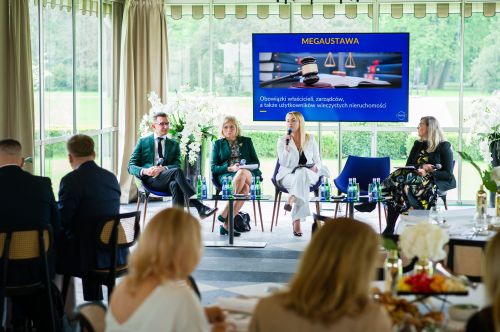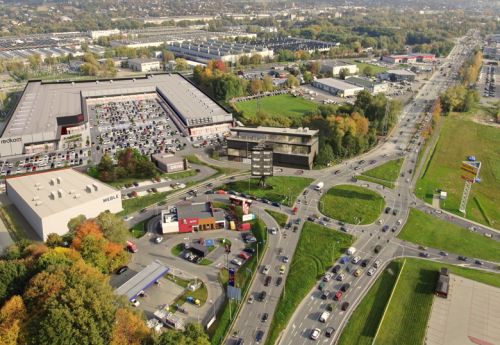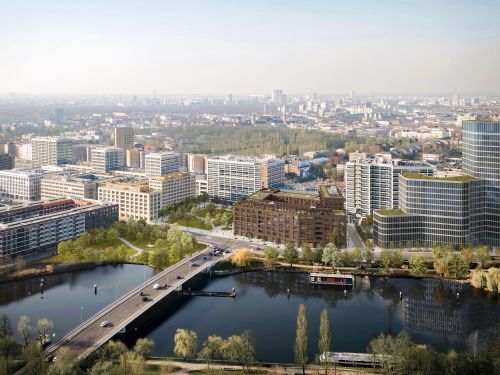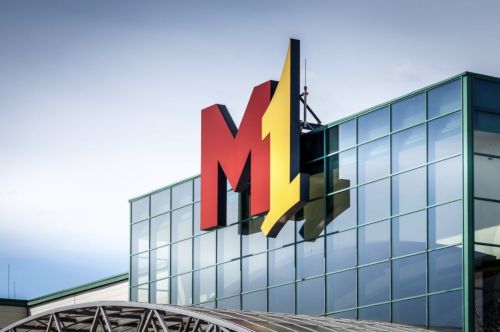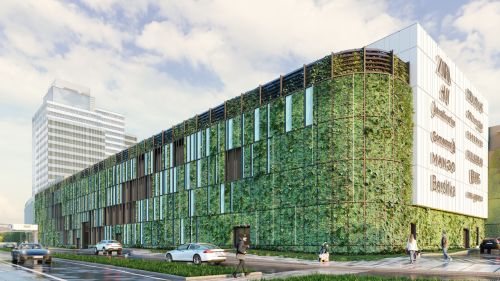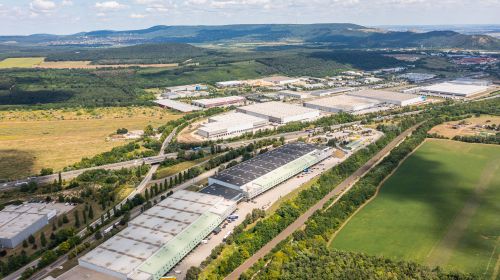Happy family
ConstructionRafał Ostrowski, ‘Eurobuild CEE’: How did you manage to win such a large number of contracts this year?
Dariusz Grzeszczak, President of joint-stock company Erbud: We have been having a building boom both in terms of public and
private projects in Poland. With a portfolio worth PLN 1.5–1.6 bln this year looks at least as good as 2014, which was a record year for us, with a nearly 40 pct growth in revenue.
Is this a result of the boom on the market or a well-judged strategy?
Many factors are having an impact on Erbud’s current business situation. We have been working on our current strategy for the last ten years. The company’s success results from being able to predict trends and acting in advance. We predicted at a suitable time that general construction in Poland would blossom. This was when we established a chain of five branches in key cities in Poland. Now each of these branches is generating a turnover of app. PLN 200 mln. We also expected a growth in engineering construction and based on our current local and international experience as well as the purchase of smaller businesses on the market, and we developed these operations at the right time. Currently PBDI, which carries out infrastructural projects for the group, has an annual turn-over of almost PLN 300 mln. It should be pointed out that PBDI is also developing in other areas and is building every second wind turbine in Poland at the moment. In our new power construction segment, which we started to develop four years ago, we now generate revenue of over PLN 200 mln per year. Meanwhile our development
activity in terms of apartment sales, in spite of their smaller scale, provides us with operational profitability of around 10 pct.
And what do the margins look like in the individual segments?
The construction sector in Poland is a mature market. We compete against companies from all over the world, which determines the margins. In general construction the margins are around 2 pct of EBIT. We obtain revenue of app. PLN 1 bln from this segment, which constitutes app. 60 pct of the group’s revenue. Other segments have a higher profitability. For example, in engineering construction the profitability is higher and margins are possible of as much as 3, 4 or even 5 pct per a year, depending on the individual project.
Infrastructural projects in Poland have turned out to be a bit of a minefield for many companies. Is Erbud not afraid of the consequences of possible failure in the public contract sector?
We view this segment optimistically because it continues to develop and improve. However, in order to minimise contract risks, we have adopted the policy that the orders cannot be long-term, because apart from selected infrastructural projects in Poland, public contracts do not include an indexation of contractor remuneration in relation to an increase in material prices. That is why we do not bid for long-term contracts, which we consider to be too risky. Furthermore, we only undertake contracts of a suitable size, usually app PLN 50–300 mln. Such contracts are less risky and guarantee profits. However, you need to carry out as many of them as possible to take best advantage of the current construction boom in Poland.
And what about power sector projects?
There are great opportunities for improving our profitability in this field. However, we need to expand in the segment first, so we are planning to invest both our efforts and funds in such projects. Then we will find out whether we will be able to reach margins higher than 3 pct. But our segment diversification provides us with a great deal of flexibility.
Erbud is planning to enter the Warsaw market through its development firm Budlex. What are its actual plans?
We are the leading residential developer in Bydgoszcz and Toruń, where the market has been growing gradually and steadily for a number of years. So now we have decided to extend our operations and effectively use Budlex’s experience and base for this purpose. Warsaw is one of the most dynamic residential markets in Poland, where the demand continues to rise. We are currently working on two residential projects in the capital city, where we have two plots. We hope to be issued with building permits this year, so the construction work could start at the end of this or early next year. We are talking about projects with app. 60 apartments in the popular price range, but in locations that we do not want to disclose at this time. Thus they will not be large projects in terms of the scale of our firm, but such a small start seems to be the best way to go.
What other development projects is Erbud planning, apart from the two you have mentioned?
In May this year we completed the Półwiejska 2 office and retail project in Poznań, which is virtually fully-leased and sale negotiations are in progress. When the facility is sold, probably this year or next, we can think about subsequent projects. Development projects are capital-intensive. You have to bear in mind that they involve purchasing the land and freezing assets for 2–3 years, which is why we are adjusting the
development portfolio to the company’s financial potential.
Are there any plans for another share issue?
No, there is no such need at this time or any expansion goals that would incline us in this direction.
What sort of growth in profit is planned for this and subsequent years and what is the key to improving profits?
In the long-term, the company’s profits should grow together with the development of our basic operations and new areas of the company’s activity such as the power sector and infrastructure. Looking at our current portfolio we hope to generate good revenue this year.
Are you planning to continue paying dividends?
Last year and this year we paid dividends (for 2014) of around PLN 6–9 mln. As the main shareholder I of course would be happy with a higher dividend, but the most important thing is for the company to be secure – and the company’s stability depends on its cash position, so we cannot pay out our entire profits.
Erbud started its operations in Germany and moved its main operations to Poland only after some time. Are you not considering strengthening your presence in Germany again, or in other European markets?
Indeed, we learnt our trade in Germany at the beginning of the 1990s. Thanks to this we educated our employees on this mature market and it was possible to develop dynamically in Poland in the following decade. As far as foreign markets are concerned, our presence is adapted for the economic climate of that particular country. We are carrying out projects in Germany, Holland, Belgium and France, so we will be monitoring these markets carefully and perhaps will have expanded our activities there in a few years’ time. However, the construction market in Poland is very good nowadays. This is why growing in our own country is our priority.
How long will this boom last in the Polish construction industry?
We know that European funds will flow in for five more years – until 2020. Projects will be developed using it for another two years after that. I think that these seven to ten years will be a good time for the construction sector and we can expect business to continue to boom.
25 years of Erbud
Dariusz Grzeszczak is the co-owner and a member of the management board of Erbud. He is a graduate of the Gdańsk University of Technology. From 1988 he lived and worked in Krefeld, Germany, where he co-established the Erbud construction company in 1990. The first large projects of the company included office buildings in Berlin (Friedrichstadt – for Klammt, Kontorhaus – for Heitkamp) as well as the Mogeldorf shopping centre in Nuremberg. In 1998–1999 the company carried out its first project in Poland: Castorama in Warsaw’s Targówek district. In December 1999, Erbud group’s owners were joined by Józef Zubelewicz, who had acquired 25 pct stake in the firm. In 2003 Erbud secured a strategic investor, German company Wolff & Müller (with an app. 33 pct holding). The company’s debut on the Warsaw Stock Exchange took place on May 11th 2007. With the funds raised from the issue the company was able to purchase the Bydgoszcz and Toruń-based residential developer Budlex (2007) and, subsequently, Rembet Plus (2007) as well as PRD (2008). Its next acquisition was one of the foundations of the current Erbud group – Katowice-based company JF Inwestycje (2009), followed by Engorem (2012). In 2014 Erbud Industry was joined by two more companies: Gdańsk-based NGK Ojrzyński (currently Erbud Industry Pomorze) and EnergoServ Pomorze (now Erbud Industry EnergoServ). In 2014 the Erbud group generated sales revenues of PLN 1.69 bln, which was a record result and a growth of 38 pct growth compared to its 2013 result (PLN 1.22 bln). Its operating profit amounted to PLN 43.1 mln, its net profit was PLN 27.9 mln (an over 54 pct y-o-y growth) and its EBIT profitability was around 2.55 pct. Its current order portfolio, worth PLN 1.5 bln, consists of general construction projects (63.5 pct), and mainly in the office, shopping and residential segments. These are followed by engineering, energy and road construction sector contracts (29.6 pct), development activity (3.1 pct) and technical services (3.9 pct).












